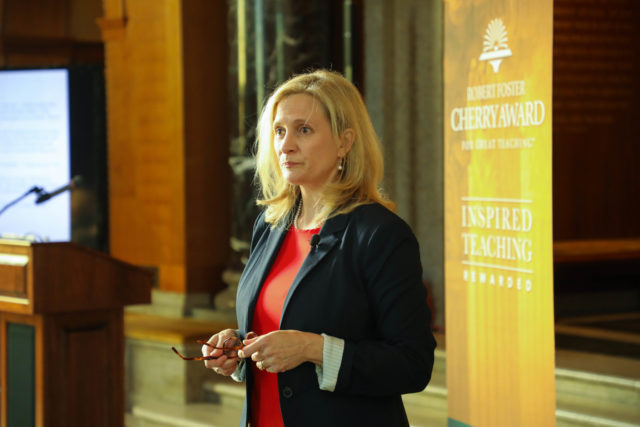By Tyler Bui | Staff Writer
Dr. Jennifer Cognard-Black, a finalist for the Cherry Award, presented her on-campus lecture Monday, addressing the influence of food literature on issues of food justice and the need for society to become better ethical eaters.
Cognard-Black is one of three finalists for the Robert Foster Cherry Award, which honors an outstanding professor who has exemplified great teaching in their area of expertise. The winner is chosen by a committee of 12 members who are academics in various fields at Baylor, and is awarded $250,000.
Dr. Michael Thompson is the chair of the Cherry Award committee. He said the award, endowed by 1929 Baylor graduate Robert Cherry, was created to reward great teaching nationwide.
“Every other year, we solicit nominations. This year we have 140 nominations, so the committee had the big task of reviewing all these great teachers and coming up with three finalists,” Thompson said. “The whole point is to honor great teaching. The finalists feel very honored to be here, and we certainly respect all that they’ve accomplished.”
Once the three finalists are chosen, they come to Baylor to present a lecture and teach a class related to their area of expertise. The committee will evaluate each professor’s time on campus and announce the winner in the beginning of next year.
Cognard-Black’s lecture illustrated her use of food literature to raise awareness of social justice issues and ethical eating.
“This is a time when our nation needs more empathy; we need to practice it, we need to nurture it, we need to grow it,” Cognard-Black said. “I began to combine the study of culinary literature with the service learning projects and action-oriented writing assignments. In this way, my aim is to channel the empathy fostered by literature, but then deepened by an embodied experience of food literature into productive social change.”
Cognard-Black is a professor at St. Mary’s College of Maryland, where she teaches multiple classes regarding food literature and its influence on social justice issues. Her students participate in field trips, genre-based writing assignments and multiple service projects while enrolled in her classes.
“My students and I consider various literary texts and how they employ food to create, sustain and privilege certain identities, ideologies and agricultural practices in both North America and Europe,” Cognard-Black said.
Cognard-Black said she has been inspired by her own experiences with food and as a professor and writer.
“As a lifelong eater myself, as well as a cook, writer and English teacher, I have long been fascinated with pieces of literature that include food,” Cognard-Black said. “Especially recipes, since they take our stories that we make and pin them to the page for others to sample, creating a history of collective taste memories.”
Cognard-Black said food literature and its influence on social justice issues is relevant to all of society because it is a topic that everyone can relate to.
“I’m passionate about this topic because obviously it’s a topic that affects everyone, and in this moment, frankly, I am all the more interested in how to preserve the human species and preserve the planet by being more mindful about our food consumption,” Cognard-Black said.
Cognard-Black stressed the power of eating and its influence on our emotions, memories and the things we associate it with.
“Eating is a story. Our tales of eating are powerful and pervasive. And yet, they also contain contradictions, for they are individual and communal, homegrown and corporate, simple and fancy, sentimental and cynical,” Cognard-Black said. “In addition, our stories of eating inform the past, create the present and shape the future.”
Cognard-Black said she hopes her research and teaching can motivate students to pay more attention to the impact of the food they are consuming.
“Pay attention. We eat mindlessly because we’re busy and because we’re multi-tasking,” Cognard-Black said. “I want people to pay attention to their food, and really think about where [the food] came from, what it is, what is it doing to the environment and how they might be able to change their eating practices to not only better themselves but to help the health of the planet as a whole.”



